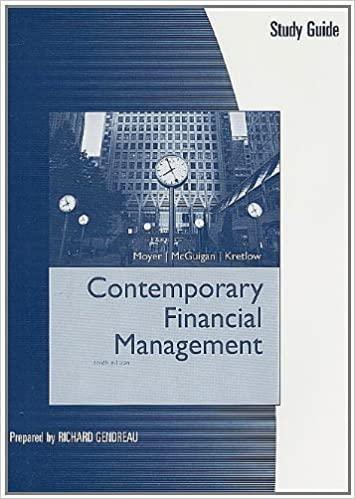Any given transaction may affect a statement of cash flows (using the indirect method) in one or
Question:
a. Net income will be increased or adjusted upward.
b. Net income will be decreased or adjusted downward. Cash flows from investing activities
c. Increase as a result of cash inflows.
d. Decrease as a result of cash outflows. Cash flows from financing activities
e. Increase as a result of cash inflows.
f. Decrease as a result of cash outflows. The statement of cash flows is not affected
g. Not required to be reported in the body of the statement.
For each transaction listed below, list the letter or letters from above that describe(s) the effect of the transaction on a statement of cash flows for the year ending December 31, 2015. (Ignore any income tax effects.)
1. Preferred stock with a carrying value of $44,000 was redeemed for $50,000 on January 1, 2015.
2. Uncollectible accounts receivable of $3,000 were written off against the allowance for doubtful accounts balance of $12,200 on December 31, 2015.
3. Machinery which originally cost $3,000 and has a book value of $1,800 is sold for $1,400 on December 31, 2015.
4. Land is acquired through the issuance of bonds payable on July 1, 2015.
5. 1,000 shares of stock, stated value $10 per share, are issued for $25 per share in 2015.
6. An appropriation of retained earnings for treasury stock of $35,000 is established in 2015.
7. A cash dividend of $8,000 is paid on December 31, 2015.
8. The portfolio of long-term investments (available-for-sale) is at an aggregate market value higher than aggregate cost at December 31, 2015.
Accounts Receivable
Accounts receivables are debts owed to your company, usually from sales on credit. Accounts receivable is business asset, the sum of the money owed to you by customers who haven’t paid.The standard procedure in business-to-business sales is that... Dividend
A dividend is a distribution of a portion of company’s earnings, decided and managed by the company’s board of directors, and paid to the shareholders. Dividends are given on the shares. It is a token reward paid to the shareholders for their... Portfolio
A portfolio is a grouping of financial assets such as stocks, bonds, commodities, currencies and cash equivalents, as well as their fund counterparts, including mutual, exchange-traded and closed funds. A portfolio can also consist of non-publicly...
Fantastic news! We've Found the answer you've been seeking!
Step by Step Answer:
Related Book For 

Contemporary Financial Management
ISBN: 9780324289114
10th Edition
Authors: James R Mcguigan, R Charles Moyer, William J Kretlow
Question Posted:





